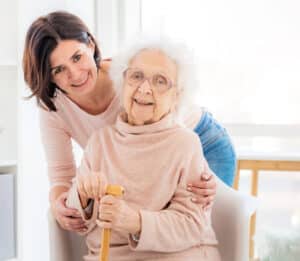Caring for the elderly is one of the most fulfilling jobs. If you like being around seniors and love taking care of them, then you should definitely give it a shot.
But before you get to it, you need to know what a PCS caregiver is, their duties, and what it takes to be one. Read on as we take you through everything you need to know to become a caregiver for the elderly.

Why Would Someone Need a Caregiver?
You are more prone to illness and injury as you get older. This is why you need someone to take good care of you. Here are other reasons why seniors might need a caregiver.
Recovering From an Illness or Surgery
Recovering from a severe illness or surgery is demanding. Sometimes someone in recovery can’t perform simple activities like taking a leak or preparing a meal. That’s where a caregiver comes in. They handle all the housework and take care of the person recovering so they can focus on getting better.
At Risk of Falling
With old age comes wisdom and weak bones. Some seniors and people with disabilities find it very hard to move around and are at constant risk of falling. Having a caregiver around to hold their hand and support them while they move around goes a long way in keeping them safe.
Want to Give a Spouse or Other Caregiver a Break
Seniors often find themselves feeling like a burden to those taking care of them. At times, they might want to give their spouse and other family members a break so they can focus on their lives. Getting a caregiver helps them achieve this without sacrificing the care they need.

Need an Escort to Doctor Appointments
Some seniors find it very hard to drive themselves, and others simply want company when going to doctor’s appointments. Whichever the case, one thing’s for sure: They need a caregiver to get them there and keep them company.
Need a Little Encouragement to Get Up and Move Around
Injured people and those recovering from an illness find it hard to move around. At times, the experience is so painful that they lose the motivation to get up. Having a caregiver around gives them the encouragement they need to push harder so they can recover more quickly.
Need Incontinence Care
As we age, our ability to control our bowel movements deteriorates. When this happens, we need someone to guide us through it as we find better ways to manage it. Caregivers are trained to help individuals achieve and maintain control of their bladder and bowel functions through health tips, continence assessment, and emotional support.
Need to Stay in Bed
Old age, chronic diseases, and serious injuries have one thing in common: They can make it nearly impossible for someone to move around, forcing them to stay in bed. When this happens, these individuals need someone to take care of them as they recover.

Can’t Take Care of Themselves
Sometimes, seniors, injured people, and those recovering from a major surgery find it difficult to take care of themselves. This is why they need someone to support and care for them through the ordeal.
What Is a PCS Caregiver?
PCS caregivers are professionals trained to provide care and assistance to fragile individuals. They generally work in a home care environment where they provide assistance and companionship to these individuals. The Medicaid program allows patients to hire family members as caregivers. Read on to find out the basic tasks of a PCS caregiver.
What Are the Basic Tasks of a PCS Caregiver?
Bathing
Personal hygiene is necessary to improve an individual’s quality of life. Seniors and other people with mobility issues find it very difficult to bathe themselves regularly. As such, it is your duty as an elderly caregiver to bathe them as part of their personal hygiene routine.
Feeding
It might seem pretty basic, but for those who are too weak or in pain, feeding themselves can be very difficult. Caregivers help by encouraging them to eat or spoon-feeding them when necessary.
Dressing
If your patient is too weak or in so much pain that they can’t dress, it is your duty to pick their clothes out for them and help them get dressed.
Bathroom Needs
Bathroom needs include everything from incontinence care to sitting on the toilet. Caregivers help their patients make their bathroom sessions a little bit more manageable and comfortable.

Cooking
Seniors, the sick, and other people with mobility issues can’t cook for themselves. As such, it is your duty as a caregiver to prepare meals.
Cleaning
A clean environment goes a long way in making someone feel more comfortable. As a caregiver, you ensure that your patient’s space is always clean and tidy.
Laundry
Personal hygiene doesn’t just stop at taking a bath. Your patients need clean clothes, too. And since they can’t do their laundry, the duty falls to you.
Shopping
If your patient can’t manage to do their shopping, you will go out and shop for everything they need.
Medication Management
Seniors are often clouded with memory issues. At times, they forget to take their medication or might take the wrong dose. As a caregiver, it is your duty to remind them to take their medication. In some circumstances, you might have to administer it yourself.
Appointments
As a caregiver, you keep track of your patient’s appointments. You should also accompany them to their doctor visits.
Physical Therapy
Patients suffering from injuries and other mobility issues need physical therapy to recover more quickly. Caregivers can help them by giving them massages, heat treatment, and basic exercises.
Companionship
Staying in the house all day, especially when you’re bedridden, can get lonely. That’s why caregivers are tasked with providing their patients with companionship.
Help Moving Around
If your patient has trouble moving around, it is your duty as a caregiver to give them physical support to help them get around more easily.
Entertainment
Entertainment can include everything from watching a fun TV show to having an interesting conversation. As a caregiver, you should keep your patient entertained.
Just like any profession, you need to possess certain qualities to become an elderly caregiver. Read on for more insight.
Qualities Needed to Be an Elderly Caregiver
Patience
When dealing with the elderly, you have to be patient. Seniors may take longer to comprehend certain things. And in some cases, they may require a different level or type of communication.
Sense of Humor
When you think about caring for an ill or aged client, responsibility, sacrifice, and stress are words that typically come to mind. But you might miss out on something as simple as humor that makes life more interesting for you and your client.
Positive Attitude
Sometimes, being a caregiver can get pretty challenging. In such times, having a positive attitude goes a long way in making your job more manageable.
Determination
Being a caregiver isn’t all rainbows and unicorns. You have to be ready to give your patients the care they deserve, even when difficulties arise.
Initiative
Caregivers often work unsupervised in their patient’s homes. Therefore, you need to be comfortable making informed decisions, being proactive, and taking action in emergencies.

Emotional Understanding
Seniors go through a lot of emotional turmoil. As such, a caregiver should be able to understand their situation and help them cope with it.
Good at Balancing Many Tasks
Taking care of a senior can get pretty overwhelming. At times, you might have to do a few things simultaneously without taking your eyes off your patient. As such, having the ability to balance multiple tasks is an invaluable skill every caregiver should possess.
Giving
Caring for a senior isn’t just a job. You have to have the heart for it. You have to be ready to give both your time and energy to take care of your patients. If you get fulfilled from doing these things, then you’ll be a good caregiver.

How Are In-home Caregivers Paid?
In-home caregivers are paid through various channels. These include:
Medicaid
Medicaid pays for in-home care in all 50 states across the US. However, the caregiver’s pay depends on the state and the Medicaid program in which the patient is enrolled.
Long-term Insurance
Some private long-term insurance providers pay for select senior care services. But like Medicaid, the amount the caregiver stands to earn depends on the patient’s coverage.
Private Pay
Some seniors who are financially stable prefer paying their caregivers themselves. In such cases, the caregivers can negotiate their terms of employment with their patients or their relatives.
Workers’ Compensation
Seniors can collect their workers’ compensation payments to pay their caregivers.
Veteran Benefits
A&A benefits provide up to $1,794 per month to veterans. Veterans approved for A&A can use their benefits to hire an in-home caregiver.
How to Become a PCS Caregiver in Nevada
To become a PCS caregiver in Nevada, you must meet certain qualifications. For starters, you must complete at least 16 hours of state-approved Certified Nursing Assistants (CNA) training and 12 hours of Continuing Education (CE) annually. If you’re ready to become a PCS caregiver in Nevada, check out FreedomCare NV.
Become the Best Caregiver
Whether you plan on doing it professionally or are looking to take care of a close family member, being a caregiver for the elderly will give you all the satisfaction you could ever hope for. We hope the information on this guide will set you on the right track to being the best caregiver you could be.
